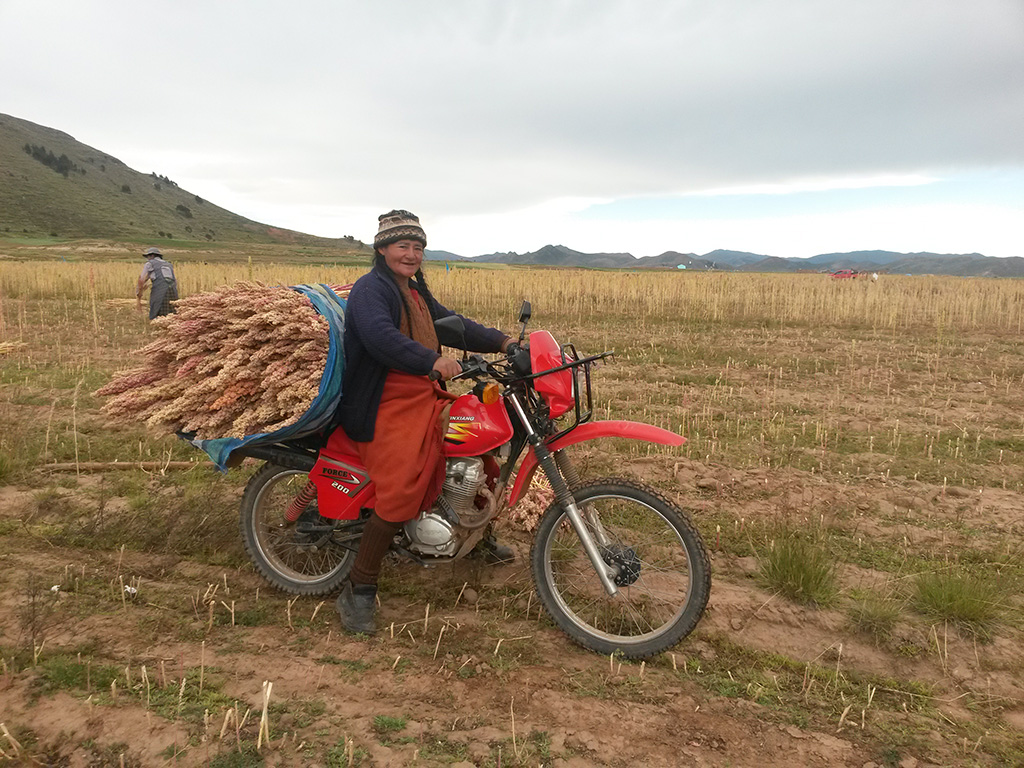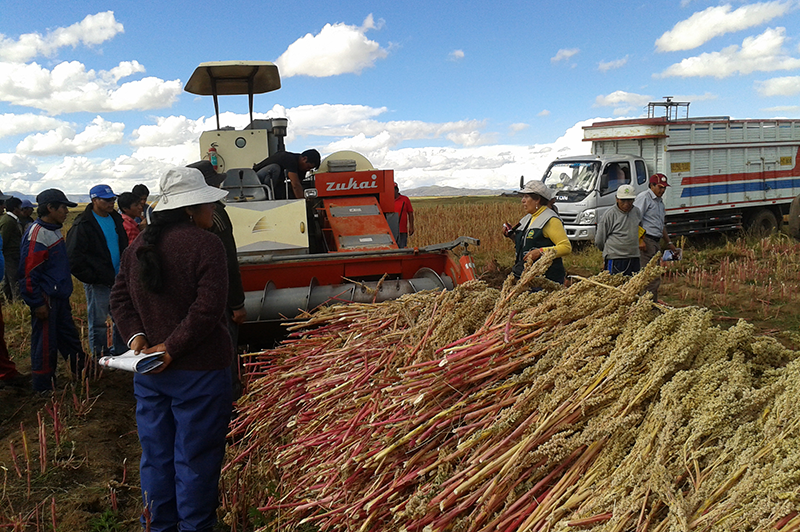ILO and Euroclimate report says that the ecological transition can reduce the gender gap if an integrated and interdependent approach to climate and social policies is adopted.
Madrid, 8 March 2023 - The report Green jobs, an opportunity for women in Latin America mujeres en América Latina. Climate change, gender and just transition, a collaborative research between the International Labour Organisation (OIT) and the European Union's Euroclima programme, explores how climate change mitigation and adaptation policies can contribute to gender equality through the creation of green jobs.
According to the report, a just transition implies an integrated approach that recognises the interdependence of climate and environmental, economic, social and gender policies, as well as a stronger incorporation of a gender perspective in the diagnosis of the effects of climate change and the design of climate change adaptation and mitigation policies.
Green jobs, an opportunity for women in Latin America was presented in a virtual event by Claudia Coenjaerts, ILO Regional Director a.i. for Latin America and the Caribbean, and Inmaculada Zamora, Secretary General of the International and Ibero-America Foundation for Public Administration and Policies (FIIAPP), one of the seven organisations participating in the EUROCLIMA+ Programme and co-financier of the report. Dali Angel, Coordinator of the Youth and Indigenous Women Programme of the Fund for the Development of Indigenous Peoples of Latin America and the Caribbean (FILAC) and María Elena Valenzuela, author of the report, also participated in the launch of the report.
The report finds that climate change and extreme weather events have an unequal impact on men and women. Natural disasters increase the workload of women, who bear the burden of care work in families. This is compounded by the lack of basic services and school closures, which leads many women to withdraw from the labour market, losing their sources of income and their options for personal autonomy.

Public policies are key to correcting the gender gap during the ecological transition.
"If the right policies are not put in place, inequality gaps are at risk of widening. The transition to a more sustainable economic model will entail the creation of a whole new generation of green jobs. There is a risk that women will not be able to access these jobs and, to avoid this, it is essential to implement training and capacity building measures to help overcome the gender gap in this field", said Inmaculada Zamora, Secretary General of the FIIAPP, during the presentation of the report.
A previous study of the ILO/IDB estimated that the transition to a more sustainable economy could lead to the creation of up to 22.5 million new jobs in sectors such as agriculture, forestry, renewable energy, construction and manufacturing. However, most of these jobs would be in highly male-dominated sectors and, if current patterns of occupational segregation continue, only 4 million would be filled by women.
The report Green jobs, an opportunity for women in Latin America concludes that occupational segregation and images of appropriate careers for men and women persist, despite the increase in women's educational attainment, which now exceeds men's. Gender stereotypes discourage women from entering science and technology careers, resulting in women's under-representation in areas of economic activity where decarbonisation efforts are concentrated.
Against this reality, Claudia Coenjaerts, ILO Regional Director for Latin America and the Caribbean says: "Gender-neutral climate policy responses can have negative effects. For example, gendered occupational stereotypes are likely to persist even in the green economy, preventing women from benefiting from the new jobs of the future. It is imperative to seize the opportunity to make climate policies part of a transformative agenda that promotes a just transition to more sustainable and less unequal societies”.
Referring to the need for a just transition to an environmentally sustainable economy that contributes to the goals of decent work, social inclusion, poverty elimination and gender equality, the report stresses that an integrated approach is required when designing public policies that recognise the interdependence of the environmental, socio-economic and gender dimensions.
The report stresses that strategies to combat climate change and promote environmental sustainability must empower women - especially indigenous and Afro-descendant women - and increase their participation in discussion, negotiation and decision-making on climate issues.
Regarding the issue of employment, the report states that employment, enterprise promotion and social protection policies are key axes in climate change mitigation and adaptation plans.
Incorporating a gender dimension into these policies means addressing the disadvantages - greater digital illiteracy, less access to capital, land, finance and technical assistance - that women face. This would allow the transition to a more sustainable economy to contribute to overcoming gender inequality at the same time.
To achieve this goal would require, on the one hand, an alliance between the political institutions responsible for environmental, labour and education issues and, on the other, the incorporation of specific measures in gender equality plans to address the disproportionate impact that climate change has on the lives of Latin American women.
You can consult the report here.
For more information:
Juan Ignacio Cortés
This email address is being protected from spambots. You need JavaScript enabled to view it.
About the ILO
The ILO is the only tripartite agency of the United Nations. Dedicated to the world of work, it was established in 1919. The ILO brings together governments, employers and workers from 187 member states to set labour standards, develop policies and devise programmes that promote decent work and social justice.
About Euroclima
Euroclima is a programme funded by the European Union and co-financed by the German federal government through the Federal Ministry for Economic Cooperation and Development (BMZ), as well as by the governments of France and Spain through the Ministry of Foreign Affairs, European Union and Cooperation.
The Programme's mission is to reduce the impact of climate change and its effects in 33 countries of Latin America and the Caribbean, promoting mitigation, adaptation, resilience and climate investment and biodiversity. It is implemented according to the "Spirit of Team Europe" under the synergistic work of seven agencies: the Spanish Agency for International Development Cooperation (AECID), the French Development Agency (AFD)/ Expertise France (EF), the Economic Commission for Latin America and the Caribbean (ECLAC), the International and Ibero-America Foundation for Administration and Public Policy (FIIAPP), the German Society for International Cooperation (GIZ) GmbH, and the UN Environment Programme (UNEP).
About FIIAPP
FIIAPP supports the building of public systems in more than 120 countries. We do this by promoting public talent and knowledge exchange between peer institutions in different countries. As a public foundation, our work is part of Spanish and European outreach. We are committed to the value of the public sector to improve the lives of people and the planet.

